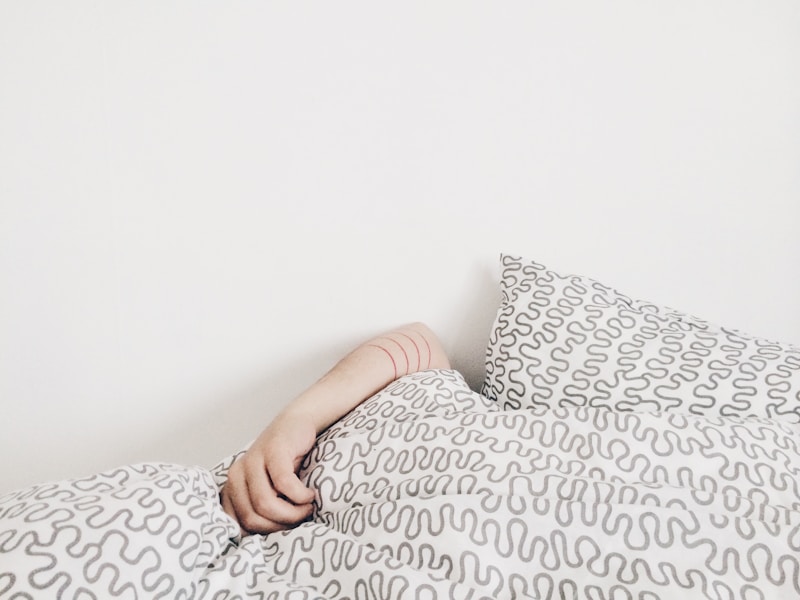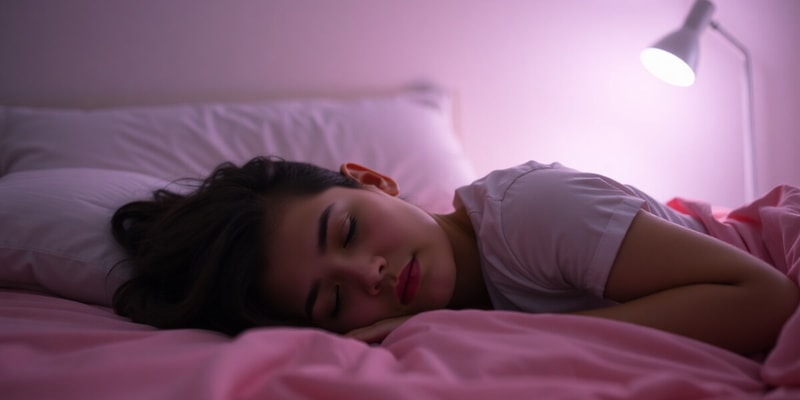Podcast
Questions and Answers
What role does sleep deprivation play in the amygdala's response to stimuli?
What role does sleep deprivation play in the amygdala's response to stimuli?
Which statement correctly describes the bidirectional relationship between sleep and mood?
Which statement correctly describes the bidirectional relationship between sleep and mood?
What does research suggest about sleep problems and future mood disorders?
What does research suggest about sleep problems and future mood disorders?
What brain region is involved in processing rewarding stimuli and was studied for its response to sleep conditions?
What brain region is involved in processing rewarding stimuli and was studied for its response to sleep conditions?
Signup and view all the answers
What behavioral outcomes are linked to increased activity in the brain's reward system following sleep deprivation?
What behavioral outcomes are linked to increased activity in the brain's reward system following sleep deprivation?
Signup and view all the answers
What effect can one night without sleep have on depressed patients?
What effect can one night without sleep have on depressed patients?
Signup and view all the answers
Which of the following studies implicated increased activity in the ventral striatum related to sleep disturbances?
Which of the following studies implicated increased activity in the ventral striatum related to sleep disturbances?
Signup and view all the answers
What is a potential consequence of continued sleep deprivation in individuals with insomnia?
What is a potential consequence of continued sleep deprivation in individuals with insomnia?
Signup and view all the answers
What mechanism is being researched to understand the relationship between sleep and mood disorders?
What mechanism is being researched to understand the relationship between sleep and mood disorders?
Signup and view all the answers
What describes the effects of long-term disrupted sleep in relation to mood disturbances?
What describes the effects of long-term disrupted sleep in relation to mood disturbances?
Signup and view all the answers
What primary neurotransmitters are impacted by MDMA?
What primary neurotransmitters are impacted by MDMA?
Signup and view all the answers
What is the main sleep-related complaint observed 48 hours after ingesting MDMA?
What is the main sleep-related complaint observed 48 hours after ingesting MDMA?
Signup and view all the answers
In cannabis users, what effect is strongly associated with REM sleep?
In cannabis users, what effect is strongly associated with REM sleep?
Signup and view all the answers
What major area of research challenges exists regarding cannabis and its effects on sleep?
What major area of research challenges exists regarding cannabis and its effects on sleep?
Signup and view all the answers
What happens to REM sleep after cannabis withdrawal?
What happens to REM sleep after cannabis withdrawal?
Signup and view all the answers
What is the primary mechanism through which sleep deprivation is believed to help patients with major depressive disorder?
What is the primary mechanism through which sleep deprivation is believed to help patients with major depressive disorder?
Signup and view all the answers
What is a significant concern regarding the dosage of melatonin supplements?
What is a significant concern regarding the dosage of melatonin supplements?
Signup and view all the answers
What is a critical effect of sleep deprivation mentioned in the content?
What is a critical effect of sleep deprivation mentioned in the content?
Signup and view all the answers
Which of the following statements best describes the impact of cocaine on sleep during its use?
Which of the following statements best describes the impact of cocaine on sleep during its use?
Signup and view all the answers
Which of the following drugs is NOT mentioned as having an effect on total sleep time or sleep architecture?
Which of the following drugs is NOT mentioned as having an effect on total sleep time or sleep architecture?
Signup and view all the answers
What occurs during cocaine withdrawal that affects sleep?
What occurs during cocaine withdrawal that affects sleep?
Signup and view all the answers
What is a commonly reported issue with melatonin as a sleep aid?
What is a commonly reported issue with melatonin as a sleep aid?
Signup and view all the answers
What role does melatonin play in relation to the body's internal clock?
What role does melatonin play in relation to the body's internal clock?
Signup and view all the answers
How does the endocannabinoid system relate to sleep as per the content?
How does the endocannabinoid system relate to sleep as per the content?
Signup and view all the answers
MDMA use is associated with changes predominantly in which sleep stage?
MDMA use is associated with changes predominantly in which sleep stage?
Signup and view all the answers
Which statement best reflects the relationship between emotional well-being and drug-induced sleep disruption?
Which statement best reflects the relationship between emotional well-being and drug-induced sleep disruption?
Signup and view all the answers
What notable feature has been associated with melatonin supplements in relation to quality control?
What notable feature has been associated with melatonin supplements in relation to quality control?
Signup and view all the answers
What is the main effect of REM sleep inhibition due to stimulant drug use?
What is the main effect of REM sleep inhibition due to stimulant drug use?
Signup and view all the answers
Which of the following factors complicates the use of melatonin as a supplement for sleep?
Which of the following factors complicates the use of melatonin as a supplement for sleep?
Signup and view all the answers
What is the primary neurotransmitter affected by cocaïne that plays a role in mood regulation?
What is the primary neurotransmitter affected by cocaïne that plays a role in mood regulation?
Signup and view all the answers
Study Notes
Sleep Deprivation & Mood
- Short-term sleep deprivation increases amygdala response to upsetting stimuli.
- Chronic sleep deprivation, especially in insomnia, has severe consequences for daily functioning.
- Sleep disorders are often linked with mental health problems like depression and anxiety.
- This relationship is bidirectional: Sleep disturbance causes mood problems, which in turn worsen sleep.
- Sleep problems can predict future mood disorders.
- Sleep disturbances, especially in bipolar disorder, indicate an imminent manic episode.
Sleep, Depression & Reward
- Research on the connection between sleep and mood disorders focuses on identifying the mechanisms involved.
- Functional neuroimaging reveals changes in brain activity after sleep deprivation.
- The striatum (involved in processing rewards) shows a stronger response to reward stimuli after a night without sleep.
- This increased striatal activity could explain risk-taking, reward-seeking, and poor decision-making in sleep-deprived individuals.
- Sleep deprivation may offer temporary mood improvement in depressed individuals, but this effect fades quickly.
Therapeutic Sleep Deprivation
- Sleep deprivation is an effective treatment for major depressive disorder in about 60% of patients.
- However, relapse rates are high (around 80%) after sleep deprivation treatment.
- Sleep deprivation has negative side effects.
- Sleep deprivation may improve synaptic plasticity in the brain, which may explain its antidepressant effects.
- Researchers are actively searching for alternative treatments that mimic the positive effects of sleep deprivation without its drawbacks.
Melatonin Supplementation
- The pineal gland releases melatonin, a hormone that regulates sleep.
- Melatonin is available over-the-counter and is sometimes used to adjust to jetlag and manage circadian rhythm disorders.
- Its effectiveness in improving sleep is not well-established for healthy individuals.
- Older adults may benefit from melatonin as a sleep aid.
- Melatonin supplements have wide variations in concentration, which can be problematic.
- High doses of melatonin may suppress the body's natural melatonin production.
- Some supplements contain serotonin, potentially dangerous in long-term use.
Cocaine, Ecstasy & Cannabis
- Cocaine, MDMA, and cannabis influence mood and sleep patterns.
- These drugs disrupt REM sleep, which is important for memory consolidation.
- REM sleep disruption can harm emotional stability and well-being.
- Sleep quality during drug abstinence predicts future relapse.
Cocaine
- Cocaine inhibits dopamine reuptake and increases serotonin and norepinephrine levels, leading to feelings of euphoria, alertness, and restlessness.
- Cocaine use disrupts sleep, leading to longer sleep onset, reduced REM sleep, and impaired sleep architecture.
- Cocaine withdrawal causes a reversal of these effects, leading to lower serotonin and norepinephrine levels, difficulties falling asleep, and increased REM sleep.
- This REM rebound can be intense and even manifest as waking dreams in severe cases.
Ecstasy (MDMA)
- MDMA affects dopamine and serotonin levels.
- MDMA use is linked to increased wakefulness, sleep disturbances, and a significant reduction in REM sleep.
- Heavy MDMA use is associated with reduced stage 2 NREM sleep and overall deterioration of sleep architecture.
Cannabis
- Cannabis affects the endocannabinoid system, influencing pain, arousal, and sleep.
- The effects of cannabis on sleep are not fully understood, and research is limited due to legal constraints.
- Cannabis primarily reduces REM sleep duration and intensity.
- Regular cannabis users report a lack of dreams and experience REM rebound with vivid dreams after abstaining from the drug.
Studying That Suits You
Use AI to generate personalized quizzes and flashcards to suit your learning preferences.
Description
Explore the intricate relationship between sleep deprivation and mood disorders in this quiz. Discover how sleep disturbances can lead to severe consequences for mental health, including increased risk for depression and anxiety. Delve into the neuroscience behind these connections and understand the bidirectional nature of sleep and mood.




